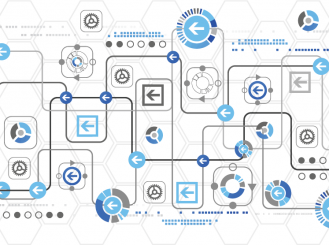Oct 13, 2015
Describes vision for CancerLinQ and calls on Congress to ensure widespread interoperability of electronic health records
ASCO recently outlined steps Congress should take to advance the widespread interoperability of electronic health records (EHRs) and prevent the practice of “information blocking.” The recommendations were outlined in an ASCO position statement released during a Capitol Hill briefing on big data, during which the Society also described its vision for CancerLinQ™.
The Office of the National Coordinator for Health Information Technology defines an interoperable health information technology (HIT) system as one that “makes the right data available to the right people at the right time across products and organizations in a way that can be meaningfully used by recipients.”1 To meet this standard, says ASCO, all HIT initiatives that utilize big data must have the ability to electronically share clinical information between practitioners.
“The treatment of cancer is complex, often requiring coordination of care and the exchange of detailed clinical information among multiple health care providers using different health information systems,” said ASCO President Julie M. Vose, MD, MBA, FASCO. “Widespread interoperability for sharing electronic health information is not just a matter of efficiency, but critical for optimal cancer care. It is essential to help patients and physicians navigate the complex continuum from diagnosis through treatment and beyond.”
Growing challenges to information sharing
EHRs often contain data that cannot easily be shared among physicians or contributed to quality improvement, public health reporting, or analytics. In addition, ASCO is observing a growing trend in commercial business practices that are creating barriers to interoperability, including information blocking—the practice of knowingly and unreasonably interfering with the exchange or use of electronic health information. Although some information-sharing challenges are related to legitimate measures taken to safeguard privacy and security, information- blocking schemes appear to be on the rise, asserts ASCO.
ASCO is calling on Congress to build on efforts currently underway to address the interoperability of electronic health record systems. In July, the U.S. House of Representatives passed H.R. 6, the 21st Century Cures Act, which contained language addressing interoperability.
“The House has taken significant steps toward these recommendations in the 21st Century Cures legislation, and we commend the Energy and Commerce Committee for its leadership on this issue,” said Dr. Vose. “We ask that the Senate adopt that language because further delay in this effort will be detrimental to patient care.”
In addition to supporting the provisions in the 21st Century Cures Act, ASCO urges Congress to take the following additional steps:
- Congress should enact legislation as quickly as possible to ensure widespread interoperability is achieved.
- Congress should pass legislation to remove barriers to interoperability, especially information blocking.
- Policymakers should ensure that patients with cancer, oncologists, and other oncology providers do not bear the costs of achieving interoperable electronic health records and of companies refraining from information blocking.
- Federal officials should work with ASCO and other stakeholders to ensure that health care providers have the information necessary to be prudent purchasers and users of health information technology systems.
CancerLinQ is a project of CancerLinQ LLC. For more information, please visit CancerlinQ.org.
1. Office of the National Coordinator for Health Information Technology. (2015). Connecting Health and Care for the Nation: A Shared Nationwide Interoperability Roadmap. Washington, D.C.: U.S. Government Printing Office.

